Teacher Exchange: from Poland to Portugal
From 14 - 17 December Tomasz Ordza visited Helena Pires in Portugal. They worked on their border crossing project about hydroponics as innovative to grow plants without soil.
This is their report:
Concrete Content and Outcomes of the Teacher Exchange
- Exchange of Best Practices: Polish and Portuguese teachers shared methods for incorporating hydroponics into the curriculum, fostering ecological awareness in students.
- Student Engagement: Students actively participated in hydroponic activities, meal preparation, and presentations, highlighting their understanding of sustainability concepts.
- Cultural Exchange: Visits to historical sites and cultural landmarks deepened mutual appreciation for each country’s heritage.
- Environmental Focus: Emphasis on marine ecosystems, hydroponics, and urban sustainability reinforced the project’s theme of ecological responsibility.
New Ideas and Suggestions
- Hydroponics as a Community Project: Extend hydroponics to involve local communities and parents, fostering wider environmental awareness.
- Digital Collaboration: Create a shared online platform for students to showcase their projects and exchange ideas year-round.
- Future Exchange Themes: Consider incorporating renewable energy or circular economy practices into future exchanges.
- Joint Publications: Collaborate on an eBook documenting the hydroponic methods and biodiversity explored during the exchange.
- Follow-Up Activities: Organize virtual workshops to maintain momentum and track the implementation of hydroponic projects.
Do you intend to incorporate ideas you gained at the teacher exchange into your own lessons? If yes, which ones?
I fully intend to incorporate several ideas from the teacher exchange into my lessons. The key concepts I plan to implement are as follows:
- Hydroponic Cultivation in the Classroom:
- Introduce small-scale hydroponic systems in science classes to teach students about sustainable agriculture and innovative food production methods.
- Engage students in growing their own plants and tracking their growth, combining biology with hands-on practical learning.
- Integration of Environmental Topics:
- Develop lessons that highlight marine ecosystems, inspired by the visit to the Oceanarium and Dolphin Museum.
- Discuss local biodiversity and conservation efforts, using the Sado River and prairies marinhas as case studies.
- Student-Led Presentations:
- Encourage students to present their projects, following the example of Augusto Cabrita School’s hydroponic garden presentation.
- Foster communication skills and ownership of learning outcomes by having students explain their projects to peers and visitors.
- Interdisciplinary Approach:
- Combine science and culinary arts by organizing activities where students use school-grown produce to prepare meals, as demonstrated during the exchange.
- Explore the cultural and nutritional aspects of food, linking sustainability to health and tradition.
- Collaborative Projects:
- Initiate international eTwinning projects focused on environmental sustainability to strengthen intercultural awareness and collaboration.
- Use digital platforms to exchange ideas and share progress on hydroponic and biodiversity-focused initiatives.
These ideas will enrich the curriculum, engage students in active learning, and promote ecological responsibility. They also align with broader goals of fostering critical thinking, collaboration, and innovation in education.
Do you plan to stay in contact and continue the exchange? If yes, what did you agree on?
I plan to stay in contact and continue the exchange. We agreed on the following points to ensure ongoing collaboration:
- Regular Communication: Maintain contact through email and WhatsApp to share updates, ideas, and progress on sustainability projects.
- Follow-Up SonS and eTwinning Projects: Develop a new eTwinning project that focuses on environmental education and sustainability, building on the hydroponic and biodiversity themes explored during the exchange.
- Virtual Meetings: Organize periodic virtual meetings for teachers and students to present updates on their respective projects, fostering continued collaboration and knowledge sharing.
- Shared Resources: Create a shared online platform to exchange lesson plans, project outcomes, and best practices, ensuring the sustainability of the ideas introduced during the exchange.
- Future In-Person Visits: Plan for a reciprocal visit where Portuguese teachers and students can experience our school’s environment, projects, and community involvement.
- Joint Events: Explore opportunities to co-host events such as Earth Day celebrations or environmental awareness campaigns that align with the goals of the exchange. These agreements provide a strong foundation for a lasting partnership that benefits both schools and promotes sustainable education.
Do you intend to apply for the next Science on Stage festival with a joint project?
I intend to apply for the next Science on Stage festival with a joint project. During the exchange, we discussed the potential to develop a collaborative project that builds on the sustainability themes explored in our activities. Our joint project proposal would likely focus on hydroponics and biodiversity conservation, integrating science, technology, and environmental education.
Potential Project Details:
- Key Components:
- Hydroponics: Showcase innovative methods for growing plants sustainably in urban and school environments, using techniques learned during the exchange.
- Biodiversity Conservation: Include case studies from both Poland and Portugal, focusing on local ecosystems, such as marine prairies in Portugal and bee-friendly initiatives in Poland.
- Student Involvement: Highlight the role of students in designing, implementing, and presenting the project.
- Interdisciplinary Approach: Combine science with art, technology, and culinary skills to create a holistic educational experience.
- Festival Contribution:
- Demonstrate how schools from different countries can collaborate effectively on sustainability-themed projects.
- Present hands-on activities, such as hydroponic growing kits or biodiversity monitoring tools, to inspire other educators.
By applying for the Science on Stage festival with this joint project, we aim to showcase the strength of international collaboration and inspire other educators to incorporate sustainability into their curricula.
Your colleague teaches in another country. Was this aspect something special for you in your exchange? If yes, why?
Yes, the fact that my colleague teaches in another country was a special and enriching aspect of this exchange.
Why It Was Special:
- Diverse Educational Perspectives:
Learning about different teaching methods, curricula, and educational priorities in Portugal provided valuable insights into how sustainability is approached in other countries. For example, the focus on hydroponics and hands-on learning in Portuguese schools offered new ideas that I can adapt to my own teaching.
- Cultural Exchange:
Working with a colleague from another country deepened my understanding of Portuguese culture, traditions, and values. Activities like visiting local landmarks and experiencing regional food added a rich cultural dimension that strengthened the collaboration.
- Broader Context for Sustainability:
Observing how sustainability challenges and solutions are addressed in Portugal emphasized the global relevance of these issues. It reinforced the importance of teaching students to think beyond national boundaries and consider global perspectives in science and environmental education.
- New Inspiration for Collaboration:
The exchange highlighted the potential of cross-cultural partnerships in education. It inspired me to seek out similar collaborations in the future, as the unique perspectives and ideas shared during this exchange were incredibly rewarding. This international aspect brought fresh ideas, broadened my horizons, and reminded me of the shared goals educators have worldwide—to inspire and empower students to build a sustainable future.
Looking back, what are your impressions of the exchange?
Looking back, my impressions of the exchange are overwhelmingly positive and inspiring.
Key Impressions:
- Enriching Collaboration: The exchange provided a platform for meaningful collaboration between educators from different countries. Sharing ideas, methodologies, and experiences broadened my perspective on teaching sustainability and science.
- Practical and Engaging Activities: The hands-on sessions, such as the hydroponics classes and student presentations, were highlights. They showcased the effectiveness of practical, student-centered learning approaches.
- Cultural Appreciation: Experiencing Portuguese culture—through visits to historical landmarks, local biodiversity spots, and regional cuisine—added depth to the exchange. It created a strong connection between professional and cultural learning.
- Student Involvement: Observing how students engaged in hydroponic gardening, meal preparation, and presentations was inspiring. Their enthusiasm reinforced the value of involving students as active participants in educational projects.
- Future Potential: The exchange sparked many ideas for future projects, collaborations, and classroom innovations. It also highlighted the importance of sustainability as a global educational priority.
This exchange was a unique and valuable experience that not only enhanced my teaching practice but also strengthened international bonds. It reaffirmed the importance of sharing knowledge and working together to inspire the next generation to address global challenges like sustainability. I feel energized and motivated to incorporate the lessons learned into my work and continue fostering collaboration.
Tomasz Ordza
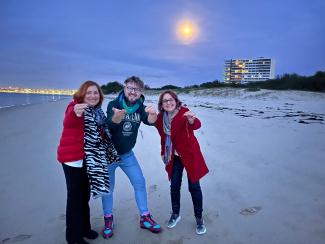
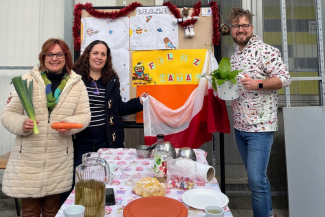
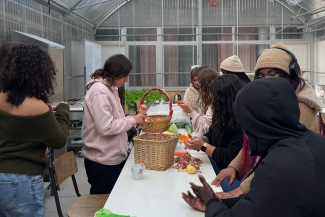
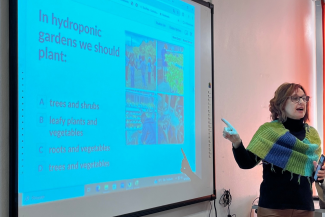
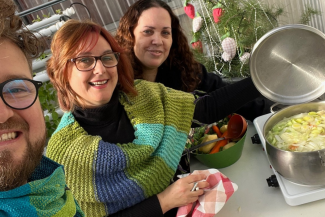
Share this page